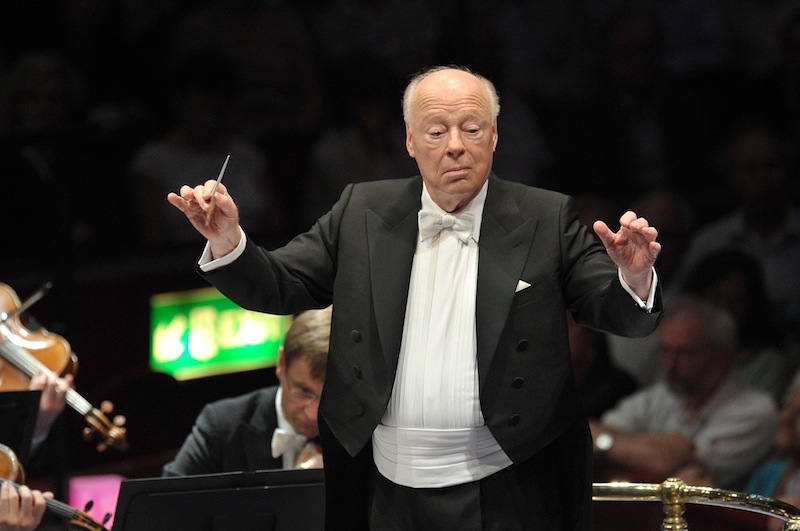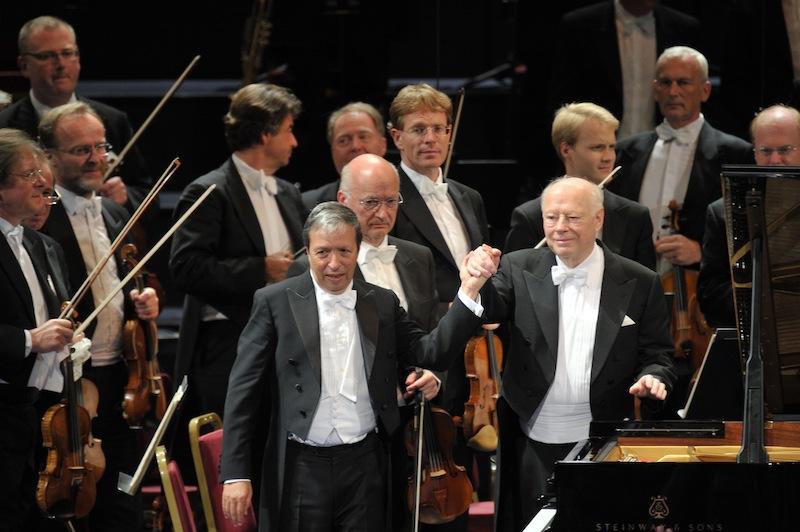You’ve never seen so many people at a Prom, thousands of them packed into every space of the Albert Hall inside, while outside a 100-metre line of hopefuls queued in vain to stand in a pit where a small cat couldn’t have been added. But then this was a luxury Prom: with the Vienna Philharmonic and two musicians of golden integrity and sensitivity, lifetime members of the high table, the pianist Murray Perahia and the conductor Bernard Haitink playing two works born in Vienna.
Size matters in the Albert Hall - they played spacious Beethoven and epic Bruckner - but it takes musicians of special clarity of mind to show that subtlety, sorrow and great gentleness are rarely more effective than when they're brought into this cavernous place, to so many people.
With wonderful judgment the night opened without overture straight into the arresting mystery of Beethoven’s Fourth Piano Concerto, premiered in Vienna in 1808. Perahia weighed out that opening call by the piano, its quiet statement of chords, with pellucid clarity, and a welcome glaze of romanticism that informed us we were with Viennese forces for the night.
Haitink tremendously exploited this quality of the Viennese to span the volume range from less than 1 right over to 11
The work stands out among Beethoven’s piano concerti for its overall quietness of heart, the constant play between major and minor keys changing moods transiently, taking paths unexpectedly into glades of new keys where music may revel for a while in a different dream, before rejoining the central path. Its slow second movement is a most strange and beautiful encounter between a gruff orchestra and a serene, singing piano, calming the beasts into silence so that the piano may quietly sigh out its own reverie alone, until seeming to wake up almost in fear that it has lost its partners and its chords. They rejoin, very gently and thankfully, and pile into a brilliantly merry conclusion.
Perahia and Haitink are ideal guides - their skills are, here, similar, as clear and unpolluted as mountain streams, nothing intended by them other than leading you unmolested into Beethoven's haunting text. Yet how much more vividly stimulating to the listener's imagination this kind of playing is than welters of more insistent, self-advancing performers. Taken down to such low volume by Haitink's almost imperceptible command, the Vienna Phil strings have the expertise to thin out a thread of sound seemingly infinitely without it losing silken strength.
 Haitink tremendously exploited this quality of the Viennese to span the volume range from less than 1 right over to 11 in Bruckner’s ninth symphony, written in the Austrian capital and a monument to Vienna's Olympian expectations of scale, skill and content. I’ve often found Bruckner the hard worker of the pack of composers, lacking the essential sensual response of the ear to his own musical ideas (Beethoven can never be accused of that), but his last work, written painfully over nine years, shows him striving for an unknown that's profoundly touching to hear. It was cruel for him that he couldn’t finish his intended fourth movement, but truth to tell his incomplete work, already well over an hour long, is the more emotionally affecting by ending in a huge Adagio that seems to range over the most gigantic and lonely mountains, searching for consolation.
Haitink tremendously exploited this quality of the Viennese to span the volume range from less than 1 right over to 11 in Bruckner’s ninth symphony, written in the Austrian capital and a monument to Vienna's Olympian expectations of scale, skill and content. I’ve often found Bruckner the hard worker of the pack of composers, lacking the essential sensual response of the ear to his own musical ideas (Beethoven can never be accused of that), but his last work, written painfully over nine years, shows him striving for an unknown that's profoundly touching to hear. It was cruel for him that he couldn’t finish his intended fourth movement, but truth to tell his incomplete work, already well over an hour long, is the more emotionally affecting by ending in a huge Adagio that seems to range over the most gigantic and lonely mountains, searching for consolation.
For this a couple of dozen more players bulked up the forces, with the arrangement of brass on high stepped shelves behind giving their sound a particular prominence. One fascinating layer in the Vienna string creaminess came from the arraying of the viola section front right, where usually you find second violins or cellos - this emphasised the deeper mid-notes of colour and range in the string pack, over which the metallic flute sound cut like lemon over butter. From my seat to the left I had some problems with catching an acoustic double-strike on the piano, percussion or pizzicato notes, reverberating in the Albert Hall’s strange space, but on the other hand the odd clarity and acidic thinness of the high wind instruments in the hall added a bracing chill. I wonder if those interesting acoustic flaws would be lost in the radio recording.
What a grand noise from this orchestra, like the devil’s army come to destroy
Haitink’s played this symphony for decades, and his temperateness benefits this epic, edgy work more than the stodgier earlier symphonies. This music is a country for old men, and he takes the listener by the hand like a mentor, to show us Bruckner's heart and mind. Inside the massive solemnity of the first movement a creeping atonality unsettles the typically steady tread, indicated by Haitink with the merest flecks of gesture. The venerable conductor placed every texture and tiny grading with belief in its purpose, added a measure of the aural sensuality that lies still rather latent in the composer in that movement, but which does burst out irresistibly in the second and third movements.
The scherzo is ferocious, a diabolical jagged dance, the bows tearing at the strings, fingers plucking as if to break everything down, and what a grand noise from this orchestra, like the devil’s army come to destroy. There seems no rhyme or reason for this fearsome rout to be coupled with such a playful, almost Mendelssohnian interlude, but by god the contrast is thrilling.
There can be few more bitterly emotional movements than the Adagio that was Bruckner’s last complete section. Very nearly Wagnerian in its melodiousness, laden with introspective sorrow to match Tchaikovsky, stepping courageously into spicy new chromaticisms and modulations - and yet in last night’s performance, again it was Haitink's integrity and discretion that worked so well in such highly absorbent music. One’s happy to shuck off these echoes of others to focus on a truly honest composer, of splendid orchestral gifts, a fervent heart and large imagination.
- Listen to this Prom on the BBC Radio 3 site
- Read theartsdesk's 2012 Proms coverage
- See portraits of Proms performers by photographer Chris Christodoulou on theartsdesk's Facebook page
Watch a young Perahia play the final movement of Beethoven's fourth concerto with Sir Colin Davis and the New York Philharmonic















Add comment